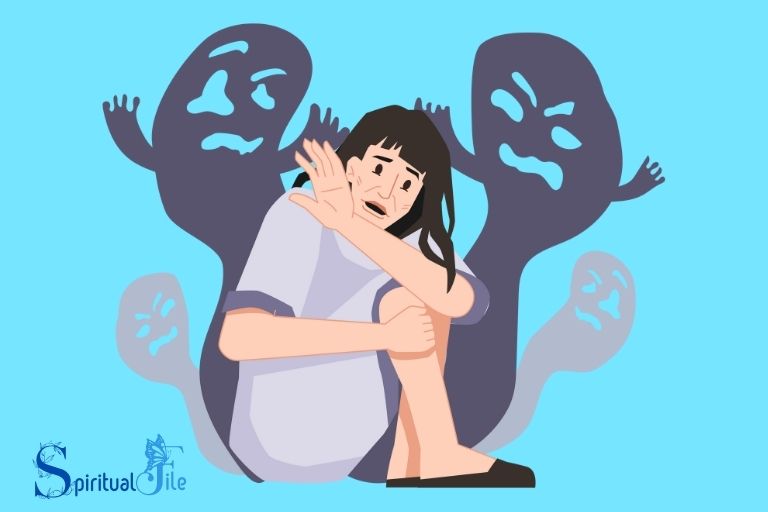Examples of Spiritual Psychosis: Hearing Voices!
Spiritual psychosis is a term used to describe a state of mind where a person has lost touch with reality due to intense spiritual or religious experiences.
Examples of spiritual psychosis may include hearing voices or seeing visions that are believed to be from a divine source, becoming overly preoccupied with religious.
Or, Spiritual practices to the point of neglecting other aspects of life, and experiencing delusions of grandeur, such as believing oneself to be a prophet or a martyr.
Spiritual psychosis is usually a result of intense spiritual practices or experiences, where the boundary between one’s spiritual beliefs and reality becomes blurred.
This condition is not officially recognized in the DSM-5, which is used by psychiatrists to diagnose mental illnesses.
However, many mental health and spiritual professionals acknowledge its existence and impact on a person’s mental wellness.
Spiritual psychosis can be a challenging condition to address as it blurs the boundary between healthy spiritual practices and mental illness.
It is essential to approach this condition with sensitivity and understanding, recognizing its deep roots in a person’s spiritual beliefs.
Intervention usually involves psychotherapy, medication, and spiritual counseling. It’s important to remember that while spiritual practices can enrich our lives,
10 Examples of Spiritual Psychosis
| Example | Description |
|---|---|
| Mystical Delusion | The individual believes they have found profound religious insights, but they are incomprehensible to others. |
| Apocalyptic Visions | The person begins having visions of the end of the world or some significant, usually catastrophic, future event. |
| Prophetic Delusion | The individual believes they have been chosen by a higher power to deliver a message or prophecy. |
| Messiah Complex | The person believes they are a savior or messianic figure. |
| Divinity Delusion | The individual believes they are a god or are becoming a god. |
| Spiritual Paranoid Delusion | The person believes they are being persecuted for religious reasons or by supernatural entities. |
| Grandiose Religious Delusion | The individual believes they have been granted special powers or abilities by a higher power. |
| Hyper-religiosity | The person experiences an intense and unusual focus on religious activities and beliefs. |
| Sin/Guilt Delusion | The individual is consumed by feelings of guilt over perceived sins, often minor or non-existent. |
| Religious Obsessions and Compulsions | The person experiences religiously themed obsessions and responds with ritualistic, compulsive behavior. |
Key Takeaway

Five Facts About: Spiritual Psychosis
Understanding Spiritual Psychosis
Understanding spiritual psychosis involves recognizing various examples of this phenomenon. These examples can include delusions of grandeur, religious obsessions, hallucinations, and extreme religious beliefs leading to harmful behaviors.
Definition Of Spiritual Psychosis
- Spiritual psychosis refers to a condition where individuals experience a distorted perception of reality due to their spiritual beliefs or practices.
- It involves a significant disruption in one’s thinking, emotions, and behaviors, leading to impairments in everyday functioning.
The Connection Between Spirituality And Mental Health
- Spirituality has been recognized as an integral part of human experience, interacting with mental health in various ways.
The following points shed light on the connection between spirituality and mental health:
- Spiritual beliefs and practices can provide individuals with a sense of purpose, meaning, and hope, promoting psychological well-being.
- Spirituality can act as a coping mechanism, helping individuals find solace and comfort in challenging times.
- Spiritual practices such as meditation and prayer have been associated with reduced stress and improved mood.
- Spirituality can contribute to a sense of connectedness, promoting social support and resilience.
Factors That Contribute To Spiritual Psychosis
Several factors can contribute to the development of spiritual psychosis.
Here are some key points to consider:
- Vulnerability factors: Certain individuals may be more prone to experiencing spiritual psychosis due to factors such as genetic predisposition, trauma, or a history of psychiatric disorders.
- Intense spiritual experiences: Engaging in intensive spiritual practices or having intense religious or mystical experiences can sometimes trigger episodes of spiritual psychosis.
- Maladaptive coping: In cases where individuals use spirituality as an avoidance strategy or as a defense mechanism to cope with unresolved emotional issues, it can lead to the development of spiritual psychosis.
- Disrupted belief systems: When an individual’s spiritual beliefs become rigid and dogmatic, they may lose touch with reality and exhibit signs of spiritual psychosis.
- Lack of support or guidance: Without proper guidance or support, individuals who embark on intense spiritual journeys may lack the necessary tools to navigate any potential risks or challenges, increasing the likelihood of spiritual psychosis.
Remember, spiritual psychosis is a complex condition that requires careful understanding and consideration of various factors.
By exploring the definition, connection with mental health, and contributing factors, we can gain valuable insights into this phenomenon.
Signs And Symptoms Of Spiritual Psychosis
Spiritual psychosis can manifest in various ways, such as hallucinations, delusions, or disorganized thoughts.
These symptoms may involve a disconnect from reality, intense religious or spiritual beliefs, and a sense of being chosen or possessing special powers.
Spiritual psychosis is a condition that can deeply impact an individual’s beliefs and perceptions. It is important to be aware of the signs and symptoms associated with this psychological phenomenon.
Here are some key indicators to watch for:
Distorted beliefs and perceptions:
- The individual may hold rigid and extreme beliefs about spirituality or religious concepts.
- They may interpret and perceive everyday events and experiences through a heavily spiritual lens, attaching unusual significance to them.
- There may be a detachment from reality and an inability to differentiate between spiritual concepts and the physical world.
Hallucinations and delusions related to spirituality:
- The person may experience auditory or visual hallucinations that are centered around spiritual themes.
- They may believe they have special powers or a divine purpose, leading them to feel chosen or persecuted.
- Delusions related to spiritual experiences can lead to unusual and irrational behaviors.
Disordered thinking and speech patterns:
- Thoughts may become disorganized and fragmented, making it difficult for the individual to communicate effectively.
- They may exhibit tangential or irrational speech, jumping from one unrelated topic to another without logical coherence.
- Their thought processes may involve grandiose and complex ideas that are challenging to follow.
Recognizing these signs and symptoms is crucial to identifying spiritual psychosis and seeking appropriate professional help.
If you notice these indicators in yourself or someone you know, it is essential to consult a mental health professional who can provide a proper diagnosis and develop an appropriate treatment plan.
Remember, mental health is a serious matter, and seeking support from professionals is vital for the well-being of individuals experiencing spiritual psychosis.
Examples Of Spiritual Psychosis
Spiritual psychosis can manifest in various ways, such as religious delusions, hearing divine voices, or experiencing intense spiritual experiences that disrupt daily life.
These examples highlight the complexity and impact of spiritual disturbances on individuals’ mental well-being.
Case Study 1: The Role Of Religious Delusions In Psychosis
Background Information On The Individual:
- A 35-year-old man, john, who had a strong religious upbringing and deeply held religious beliefs.
- He had a history of anxiety and depression, but recently started experiencing unusual thoughts and beliefs.
How Religious Beliefs Influenced Their Psychosis Symptoms:
- John began to interpret everyday events as signs from a higher power.
- He believed that he had a special mission to save the world and that his thoughts were divinely inspired.
- He experienced auditory hallucinations, hearing voices that he believed were messages from god.
Impact On Their Daily Life And Relationships:
- John’s psychosis symptoms led to impaired functioning in various areas of his life.
- He became increasingly isolated from friends and family as his beliefs became more extreme.
- His work performance suffered, and he struggled to maintain stable relationships.
Case Study 2: Shamanic Practices And Psychosis
Introduction To Shamanism As A Spiritual Practice:
- Shamanism comprises various spiritual practices found in indigenous cultures worldwide.
- Shamans often enter altered states of consciousness to connect with the spirit world.
- Shamanic rituals involve the use of music, dance, and hallucinogens to facilitate spiritual experiences.
The Fine Line Between Spirituality And Psychosis In Shamanic Experiences:
- Shamanic practices can evoke intense spiritual experiences that may resemble psychosis.
- Shamans navigate the boundary between spiritual exploration and psychological distress.
- It is vital to differentiate between culturally-sanctioned shamanic practices and actual psychosis.
The Potential Risks And Consequences Of Spiritual Practices:
- Engaging in shamanism without proper guidance and understanding can lead to psychological distress.
- Individuals may misinterpret their experiences as mystical when they are actually experiencing psychosis.
- It is crucial to approach shamanic practices with caution and seek professional guidance when necessary.
Case Study 3: Cults, Spirituality, And Psychosis
The Allure Of Cults And Their Impact On Mental Health:
- Cults often appeal to vulnerable individuals seeking spirituality and a sense of belonging.
- Manipulative tactics employed by cult leaders can negatively impact mental health.
- Cult involvement can exacerbate existing mental health issues, including psychosis.
Examining The Psychological Manipulation And Spiritual Beliefs Within Cults:
- Cult leaders employ coercive tactics to control their followers’ behavior, thoughts, and emotions.
- Manipulation often involves reinforcing and distorting spiritual beliefs to maintain control.
- Cult members may be encouraged to suppress critical thinking and unquestioningly accept the leader’s teachings.
The Aftermath Of Cult Involvement And The Path To Recovery:
- Leaving a cult can be challenging due to the psychological manipulation endured.
- Former cult members may experience symptoms of psychosis as they reassess their beliefs.
- Recovery often involves therapy, support groups, and rebuilding personal identity outside the cult.
Treatment And Support For Individuals With Spiritual Psychosis
Individuals experiencing spiritual psychosis may exhibit symptoms such as hallucinations, delusions, and spiritual beliefs that disrupt their daily lives.
Treatment and support options, including therapy, medication, and a holistic approach, aim to help manage these symptoms and promote overall well-being.
The Importance Of A Holistic Approach In Treatment
A holistic approach to treating individuals with spiritual psychosis is crucial for their well-being and recovery. It encompasses the integration of various dimensions of a person’s life and recognizes the interconnectedness of the mind, body, and spirit.
By considering the whole person, this approach helps in addressing the underlying causes and providing comprehensive support.
Here are the key points to understand regarding the importance of a holistic approach:
- Incorporating both traditional and alternative therapies
- Traditional therapy methods, such as psychotherapy and cognitive-behavioral therapy (cbt), can help individuals gain insight into their thoughts and behaviors.
- Alternative therapies, such as mindfulness-based practices and energy healing, can complement traditional approaches and provide additional support.
- Focus on physical well-being
- Physical health plays a significant role in mental and spiritual well-being. Adopting a healthy lifestyle through exercise, proper nutrition, and sufficient sleep can contribute to overall recovery.
- Integrating practices like yoga and meditation can enhance physical and mental well-being.
- Addressing social and environmental factors
- The influence of social connections and the environment on an individual’s mental state cannot be disregarded. Supportive relationships, positive social interactions, and a nurturing environment are essential for healing.
- Encouraging individuals to engage in supportive communities or spiritual groups can provide a sense of belonging and support their recovery journey.
Exploring Various Therapeutic Techniques And Interventions
A wide range of therapeutic techniques and interventions can be employed to support individuals with spiritual psychosis. By tailoring the treatment to the unique needs of each individual, progress can be made towards recovery.
Consider the following approaches:
- Cognitive-behavioral therapy (cbt)
- Focusing on identifying and challenging distorted thoughts and beliefs that contribute to spiritual psychosis.
- Developing coping strategies and healthier patterns of thinking and behavior.
- Dialectical behavior therapy (dbt)
- Enhancing emotional regulation, interpersonal effectiveness, and distress tolerance.
- Assisting in managing emotions and reducing impulsive or self-destructive behaviors.
- Mindfulness-based practices
- Utilizing mindfulness meditation to cultivate present-moment awareness and acceptance.
- Promoting self-compassion and reducing symptoms of anxiety and depression.
- Transpersonal psychology
- Exploring and integrating spiritual experiences within the therapeutic process.
- Emphasizing spiritual growth and self-transcendence.
The Role Of Spirituality In Recovery And Finding Balance
When addressing spiritual psychosis, acknowledging and integrating spirituality into the recovery process is crucial for finding balance and overall well-being. Spirituality can provide individuals with a sense of purpose, connection, and inner peace.
Here are the key aspects regarding spirituality’s role in recovery:
- Cultivating a sense of meaning and purpose
- Exploring and clarifying personal values and beliefs that align with an individual’s core self.
- Finding meaning in life experiences and understanding the connection between one’s spirituality and mental well-being.
- Encouraging self-reflection and introspection
- Promoting practices like meditation, prayer, or journaling to deepen self-awareness and understanding.
- Fostering a sense of inner peace and tranquility.
- Nurturing a sense of interconnectedness
- Recognizing the interconnection between oneself, others, and the world.
- Promoting compassion, empathy, and a sense of belonging within a greater whole.
By combining a holistic approach, utilizing various therapeutic techniques, and incorporating spirituality, individuals with spiritual psychosis can find balance and experience a transformative journey towards recovery.
– Can Itching Ear Spirituality Lead to Spiritual Psychosis?
Many believe that itching ear spirituality examples can lead to spiritual psychosis. This phenomenon occurs when individuals seek out only teachings that conform to their preconceived beliefs, leading to an unhealthy and unbalanced spiritual practice. It is important to remain open-minded and discerning in one’s spiritual journey to avoid falling into this trap.
FAQ About Examples Of Spiritual Psychosis
How Do You Ground Yourself From Spiritual Psychosis?
To ground yourself from spiritual psychosis, you can follow these simple steps:
1. Practice grounding techniques like deep breathing, meditation, or visualization.
2. Engage in physical activities or exercises that connect you with your body and the present moment.
3. Seek support from a mental health professional or spiritual counselor who can guide you through the healing process.
4. Take breaks from intense spiritual practices and focus on activities that bring you joy and relaxation.
5. Stay connected with loved ones and participate in social activities to maintain a sense of normalcy.
6. Set healthy boundaries and avoid obsessing over spiritual experiences or beliefs.
7. Stay grounded in reality by engaging in practical tasks, such as house chores or work responsibilities.
8. Avoid isolating yourself and seek out community or support groups for like-minded individuals.
9. Nurture your physical health by maintaining a balanced diet, getting enough sleep, and practicing self-care.
10. Trust your intuition and seek professional help if you notice any persistent symptoms of spiritual psychosis.
What Does A Spiritual Crisis Feel Like?
A spiritual crisis can feel like deep unrest and confusion in one’s faith and beliefs. It may involve a loss of meaning or purpose in life.
Individuals may question their religious or spiritual beliefs, doubting their previously held convictions.
There can be a sense of detachment or disconnection from others, as well as feelings of isolation.
Emotionally, it may bring about anxiety, sadness, anger, or a sense of emptiness.
Some may experience a sense of longing or searching for something more profound. A spiritual crisis, like a personal earthquake, shakes the foundations of one’s spirituality, leaving individuals uncertain and searching for answers.
It’s a turbulent time, but it can also be an opportunity for growth and transformation.
What Are The Symptoms Of Mystical Psychosis?
Mystical psychosis symptoms include hallucinations, delusions, and distorted perceptions of reality. These experiences are often intense and spiritual in nature.
People with mystical psychosis may feel a heightened sense of self or oneness with the universe. They may believe they have special powers or a divine purpose.
Other symptoms may include rapid or disorganized speech, difficulty concentrating, and erratic behavior.
It is important to note that mystical psychosis is not a recognized medical condition. Instead, it is considered a cultural, spiritual, or religious experience that can sometimes overlap with mental illness.
If you or someone you know is experiencing these symptoms, it is essential to seek professional help to properly evaluate and address the underlying causes.
What Is An Example Of A Spiritual Crisis?
A spiritual crisis can be seen in the loss of belief in a higher power. It may involve questioning the meaning of life or feeling disconnected from one’s purpose.
Another example is feeling a sense of emptiness or an overwhelming dissatisfaction with one’s current spiritual beliefs.
This crisis can be triggered by a significant life event, such as the death of a loved one or a personal setback. It can also arise from a period of intense questioning and searching for deeper meaning.
People going through a spiritual crisis may experience feelings of confusion, anxiety, or a sense of being adrift.
They may seek guidance or turn to alternative spiritual practices to find solace and regain a sense of meaning and connection.
What Are The Signs Of Spiritual Psychosis?
Signs of spiritual psychosis may include delusions, hallucinations, paranoia, and a distorted sense of reality.
Conclusion
To sum up, the examples of spiritual psychosis highlighted in this blog post shed light on the complex and multifaceted nature of the human mind.
From religious delusions to intense experiences of divine connection, these cases serve as a reminder that spirituality can sometimes intersect with mental health in unexpected ways.
It is essential to approach these phenomena with empathy and an open mind, recognizing that each individual’s experience is unique and should be treated with respect.
By fostering a deeper understanding of spiritual psychosis, we can promote dialogue and support those who may be grappling with these experiences.
Ultimately, the exploration of spiritual psychosis reminds us of the profound and mysterious depths of the human psyche, challenging us to continually broaden our perspective and offer compassion to those on their spiritual journeys.






